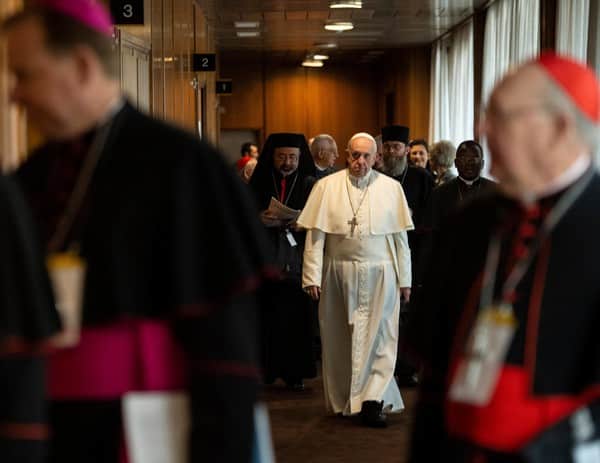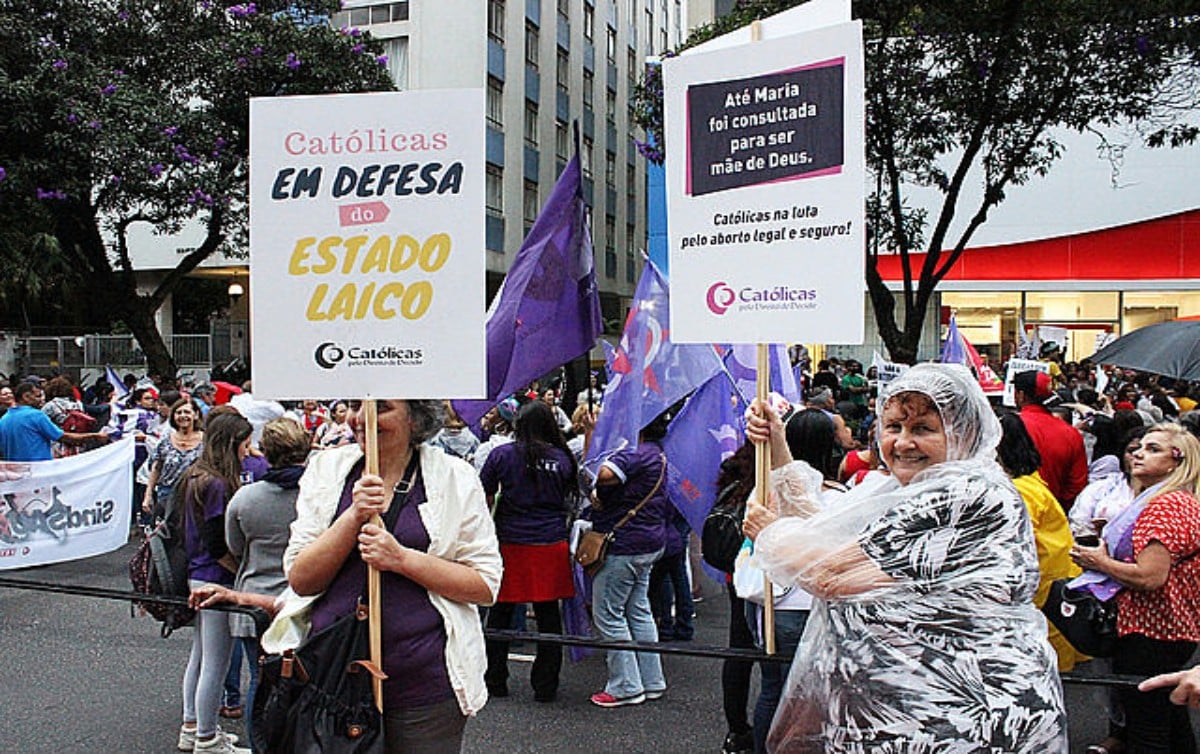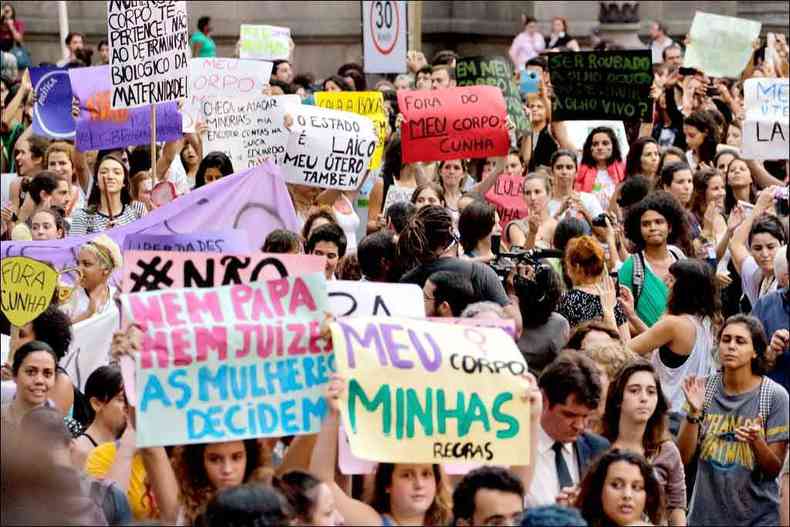Feminist Catholics and LGBT+ groups in Churches are increasingly fighting to adapt laws and the structure of Catholic doctrine.
Change always comes, and from all corners, and in religion, this would not be different for so long. One of the most traditional institutions in society, the Catholic Church finds itself at an impasse. Recently, more and more rules and structures of Catholicism have undergone adaptation attempts by feminist and LGBTQIA+ movements.
The international group “Maria 2.0”, for example, seeks to demand the appointment of a woman to the position of Pope. The so-called feminist Catholics, after all, fight for the right to a “Pope”.
In Brazil, many entities seek the possibility of a more diverse, welcoming and inclusive faith for the public. In this sense, such groups also fight for new norms regarding abortion and celibacy.

This is the case of the National Network of LGBT Catholic Groups, for example. Created in 2014, the network has a group of gay, bisexual and transgender Catholics who meet to discuss faith and religion. This type of group is growing stronger within the Church. The faithful organize themselves to show that the catechism is wrong in some aspects.
Furthermore, LGBT groups within the Church are nothing new. Dignity, for example, is one of the most famous collectives of all time. It emerged in 1969, after the Vatican banned the group’s events in parishes and other official headquarters.
Thus, from the 1980s onwards, the meetings of what is now Dignity USA ended up in Protestant temples. With the election of Pope Francis in 2013, this type of movement gained strength again. The reason for this is the fact that the Pope defends that the Church must be a welcoming environment for all people.
The LGBT Church and feminist Catholics

In addition to Catholic feminists, Cris Serra, coordinator of the National Network of LGBT Catholic Groups, today has a movement with more than 22 groups spread across communities in Brazil. According to her, the new possibilities and doors opened by Pope Francis are the result of her speech.
“The Pope is proposing structural changes in the Church,” she comments. “Anyone who sees it from the outside thinks it’s something small, but it’s not. Only through the restructuring of power within the Institution can we break with standards,” she said in an interview with Universa, the UOL website.
The coordinator also talks about how being a priest is the “perfect closet for those who don’t have the courage to confront their own sexuality”. Cris identifies as a non-binary person, and it took a long time for him to reconcile with his faith.
At the age of 20, Serra began to enter any church to confess. He asked all the priests if there was any problem with “being homosexual”. Many didn’t know the answer, but another said there was no problem, and that she was right. “All love generates life, and that’s what matters.” Thus, Cris is now one of the main LBTQIA+ activists in Brazil in the Catholic Church, and defends the review of homosexuality as a sin, as well as the inclusion of these believers in the religious world.
Change of structure

Cris Serra also preaches for the end of celibacy for members of the clergy. According to her, “this type of repression generates abuse. We need to review how the Church views sexuality.” Cris reflects on how they paint gays as “evil” people, against family and customs, while religious people are “good” people, seeking a better society. In politics, the same dichotomy of the Church is repeated. “They want to turn politics into a debate about morals and good customs instead of looking at what really matters.”
Likewise, the clerical structure of Catholicism, for the coordinator, is not correct. She also preaches for complete reform in this regard. “There are many Christian feminists and Catholic feminists thinking about and criticizing machismo and misogyny in the Church. Not everyone wants to become mothers, bishops and popes. I don’t fight for it myself. I think we would only be reproducing a sexist pattern.
Ivone Gebara, example of Catholic feminists

Nun Ivone Gebara is one of the examples of defenders of the restructuring of the Catholic Church, something she has sought for more than 50 years. She does not wish to be ordained a mother, pope or bishop. “I don’t imagine a Matriarchal Church”, comments the nun. “I believe that what can exist is a mixed Christian community. With men, women, transsexuals, homosexuals, lesbians leaders in their respective congregations, in a horizontal, not vertical, system of power.”
At the age of 22, Ivone became a nun at the Sisters of Our Lady Congregation. In this sense, as a young woman, she moved to Recife, and began working in the outskirts with Bishop Dom Hélder Câmara. The bishop was also a progressive representative of the Catholic Church. Ivone says she discovered herself as a feminist after coming into contact with the pain of women, many of whom were humiliated and mistreated at home. “Since then, the Vatican has constantly silenced me.”
In the late 1980s, the nun was forced by the Catholic Church to obtain a second doctorate in religious sciences. “They said I wasn’t well-informed enough about Catholic doctrine.” Ivone became one of the Catholic feminists after coming into contact with poor women. Thus, the Church soon saw her as a sinner and transgressor, but for Ivone, the important thing is her acceptance in the Congregation that she decided to follow.
female power

Ivone Gebara, of Catholic feminists, is celibate by choice. In any case, for her, the condemnation of LGBTQIA+ people by the Church is a mistake. “A good part of the clergy is homosexual, but Catholicism prefers to ignore this. This prevents the Church from growing and separates it from reality. Like Cris Serra, the nun does not believe that women in the clergy make a difference to the reinvention of Catholic dogmas. Quite the opposite. They can even strengthen sexist and conservative thoughts. The revolution must come from below.
Furthermore, the nun also defends the legalization of abortion in some cases. “I’m against slogans, I don’t like people calling me a ‘pro-abortion nun’. We need to be careful with women, and this care also involves not turning their pain into a flag. The group Catholics for the Right to Decide, for example, has existed since 1996 and advocates that religious women have the freedom to make decisions. This involves abortion.
The restructuring of the Catholic Church, for Cris Serra, would also help to bring in new believers. The most recent IBGE survey shows that from 2000 to 2010 there was a 61% increase in the country’s evangelical population, and 80% of Brazilians are Christians. Without a change of doctrine, for Cris, of a religion that welcomes freedom and diversity, “the Catholic Church will continue to lose strength to the Evangelical Churches”.
Anyway, what did you think of Catholic feminists?

Sign up for our newsletter and stay up to date with exclusive news
that can transform your routine!
Warning: Undefined array key "title" in /home/storelat/public_html/wp-content/plugins/link-whisper-premium/templates/frontend/related-posts.php on line 12
Warning: Undefined array key "title_tag" in /home/storelat/public_html/wp-content/plugins/link-whisper-premium/templates/frontend/related-posts.php on line 13




